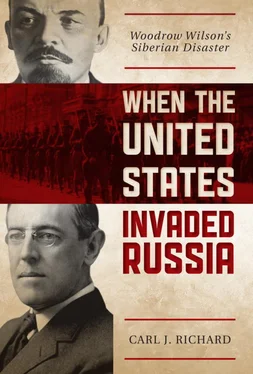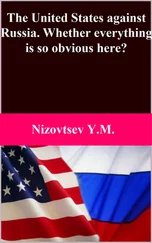But perhaps the greatest evidence that Wilson was suspicious of the British and French lies in the fact that he excluded them from his intervention plan. The plan called for the United States and Japan to send 7,000 troops each to Siberia but made no mention of any British or French forces accompanying these. In fact, Wilson did not make haste to inform the British and French of his decision to intervene. Learning of the decision from the Japanese, British Ambassador to the United States Lord Reading must have been especially distressed, given that, on July 3, only three days before the president’s decision to intervene, Wilson had promised not to make any such decision without first consulting the Allies. Reading’s notes of that meeting alleged: “I then said to the President that I presumed that he would also consult the three allied Governments [of Britain, France, and Italy] before publicly announcing a policy or even arriving at a conclusion. He said that he certainly would not act without having communicated with our three Governments.” On July 8 Lansing urged Wilson to notify the British and French of his decision before they learned of it from the Japanese, on the grounds that failure to do so would “deeply offend” them, but Wilson made no reply. In fact, when Wilson met Lord Reading that same day, he told him falsely that he had not yet made a decision on the matter. Thus, shocked to learn on July 9 that the decision had already been made to exclude British and French troops from the intervention, Reading, joined by the French and Italian ambassadors, held a meeting with Lansing the same day, in which Reading warned Lansing that “he was sure his Government would not understand action which did not include all parties.” By his own account, Lansing angered the ambassador further: “I repeated that I thought… if expediency was opposed to British participation that, to my mind, ended it.” Lansing recorded, “The British Ambassador was manifestly disturbed.” While the French and Italians were happy just to have Wilson finally approve intervention after pressuring him relentlessly for six months to do so, Reading was upset “because he felt that Great Britain had been ignored.” Against Wilson’s policy, the British immediately sent a battalion from Hong Kong to Siberia, and later dispatched some Canadian forces, and the French and Italians sent small detachments as well. The participation of the British and French upset Lansing, who wrote on August 3, “The participation of these two Governments will give the enterprise the character of interference with the domestic affairs of Russia and will create the impression that the underlying purpose is to set up a new pro-Ally Government in Siberia if not in Russia.” Evidently, Lansing did not believe that limited intervention by Japanese and American troops alone carried such a connotation. [20] U.S. Department of State, Foreign Relations, Russia, 1918 , July 6 Robert Lansing Memo, vol. 2, 263; Robert Lansing to Woodrow Wilson, July 9, vol. 2, 270; Link, Papers of Woodrow Wilson , Lord Reading to Lord Arthur Balfour, July 3, 1918, vol. 48, 513; July 8, 1918, vol. 48, 566; Robert Lansing to Woodrow Wilson, July 8, 1918, vol. 48, 561; Lord Arthur Balfour to Lord Reading, July 10, 1918, vol. 48, 622; Kennan, Russia and the West under Lenin and Stalin , 113, 115; Roy MacLaren, Canadians in Russia, 1918–1919 (Toronto: Macmillan of Canada, 1976), 145–46; Norman E. Saul, War and Revolution: The United States and Russia, 1914–1921 (Lawrence: University Press of Kansas, 2001), 293.
The few American policymakers who were more suspicious of Japan than of Britain and France opposed American intervention based on these very suspicions. For instance, much has been made of Secretary of War Newton D. Baker’s subtle implication, in the introduction to General William S. Graves’s memoirs, published in 1931, that American intervention was designed to block Japanese absorption of Siberia. But Baker never supported intervention on this or any other ground prior to Wilson’s decision, and Baker’s letter of November 27, 1918, written a few months after the start of the intervention, complained that American intervention was counterproductive precisely because it was providing a “cloak” behind which Japan could carry out its schemes to dominate the Far East. It seems clear that Baker’s views at the time of the intervention were better expressed in his contemporary message to the president than in a statement written thirteen years later, after Japan had just invaded Manchuria. [21] Graves, America’s Siberian Adventure , xi–xii; Link, Papers of Woodrow Wilson , Newton D. Baker to Wilson, November 27, 1918, vol. 53, 227.
Like the secretary of war, both the U.S. representative to the Supreme War Council and the U.S. Army chief of staff opposed the Siberian intervention based on their suspicion of the Japanese. Tasker Bliss even went so far as to suggest that if the Japanese occupied the whole Trans-Siberian Railway, rather than coming into conflict with the Germans, they might forge an agreement to divide Russia between them. Bliss declared that Japanese intervention in Siberia presented “a grave danger” and, despite tremendous pressure from other members of the council, he would consent to approve only the occupation of Vladivostok and even that with great reluctance. March held a similar view. After Wilson announced his decision to intervene in Siberia at a White House meeting on July 6, 1918, March shook his head. Wilson evaluated the gesture correctly, saying, “You are opposed to this because you do not think Japan will limit herself to 7,000 men and that this decision will further her schemes for territorial aggrandizement.” When March responded affirmatively, Wilson replied, “Well, we will have to take that chance.” Two conclusions emerge from this exchange. The first is that had Wilson’s suspicion of the Japanese been as great as March’s, he would, like March, have opposed American intervention. The second is that Wilson was not sufficiently suspicious of the Japanese to let it affect his decision to intervene, a decision based on other considerations. [22] Link, Papers of Woodrow Wilson , Tasker H. Bliss to Henry P. McCain, February 19, 1918, vol. 46, 392; Peyton C. March, The Nation at War (Garden City, N.Y.: Doubleday, 1932), 126.
Secretary of State Lansing was not obsessed with fears of the Japanese, either. In fact, during the brief period when Lansing was disturbed by the war prisoner rumors, he suggested to the president that the Japanese might be sent into Siberia as a “mandatory” of the Allies, in order to deal with the problem. When it became clear that the problem did not exist, the matter was dropped. But this incident reveals that Lansing had no great qualms about calling for Japanese intervention if it became necessary. [23] U.S. Department of State, Lansing Papers, 1914–1920 , Lansing to Woodrow Wilson, February 27, 1918, 355; March 24, 1918, 358.
Although it has been argued that Wilson was more fearful of Japanese intentions than Lansing, such was not the case. In fact, Japanese Ambassador Ishii wrote in his memoirs that, when negotiating with Lansing, he always found him to be much milder when Lansing had just come from a meeting with the president. Ishii concluded that Wilson was more “objective” about Japan than Lansing. [24] Ishii Kikujiro, Diplomatic Commentaries , trans. and ed. William R. Langdon (Baltimore: Johns Hopkins University Press, 1936), 123.
Although Wilson was not unduly suspicious of the Japanese, he opposed intervention by Japan alone because he feared a violent reaction by the Russian people. On February 4, 1918, one day after meeting with the president, British envoy Sir William Wiseman wrote that Wilson was opposed to Japanese intervention for two reasons: because he doubted, having conversed with Ambassador Ishii, that Japan would consent to it, and because he believed that Japanese intervention would drive Russia into the arms of Germany. On February 15, British Ambassador Lord Reading, having met with Wilson the same day, cited the same two reasons for Wilson’s opposition to Japanese intervention. In a second meeting with the ambassador on February 27, Wilson argued again that Japanese intervention would alienate the Russian populace. On March 2, the president made the same point at a cabinet meeting. On March 4, after meeting with Wilson, Colonel House wrote British Foreign Secretary Arthur Balfour, reiterating the same point: Japanese intervention would cause a massive uprising by the Russian people against the Allies, a development that Germany would dearly love. House had made the same argument directly to the president on February 2 and continued to reiterate it to the British throughout March. Secretary of State Lansing agreed, citing a statement of the former Russian ambassador to France to the same effect. [25] Link, Papers of Woodrow Wilson , Colonel Edward House to Wilson, February 2, 1918, vol. 46, 214–15; Robert Lansing to Tasker H. Bliss, February 2, 1918, vol. 46, 219; Sir William Wiseman to Sir Eric Drummond, February 4, 1918, vol. 46, 250; Robert Lansing to Wilson, February 9, 1918, vol. 46, 302; Robert Lansing to Walter Hines Page, February 13, 1918, vol. 46, 340; Lord Reading to the Foreign Office, February 15, 1918, vol. 46, 355; Lord Reading to Lord Arthur Balfour, February 27, 1918, vol. 46, 482; Memorandum by Frank K. Lane, March 2, 1918, vol. 46, 515; Colonel Edward House to Lord Arthur Balfour, March 4, 1918, vol. 46, 530–31; Lord Reading to Sir Eric Drummond, March 27, 1918, vol. 47, 171.
Читать дальше












